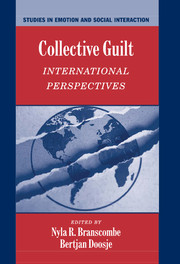Book contents
- Frontmatter
- Contents
- Preface
- List of Contributors
- Collective Guilt
- Section 1 Defining the nature of collective guilt
- 1 International Perspectives on the Experience of Collective Guilt
- 2 The Measurement of Collective Guilt: What It Is and What It Is Not
- 3 The Evocation of Moral Emotions in Intergroup Contexts: The Distinction Between Collective Guilt and Collective Shame
- 4 Collective Guilt in the United States: Predicting Support for Social Policies that Alleviate Social Injustice
- 5 Gender Inequality and the Intensity of Men's Collective Guilt
- Section 2 The Relationship Between Group Identification and Collective Guilt
- Section 3 Consequences for Intergroup Relations
- Section 4 Commentary on the Volume
- Index
- References
3 - The Evocation of Moral Emotions in Intergroup Contexts: The Distinction Between Collective Guilt and Collective Shame
Published online by Cambridge University Press: 05 January 2012
- Frontmatter
- Contents
- Preface
- List of Contributors
- Collective Guilt
- Section 1 Defining the nature of collective guilt
- 1 International Perspectives on the Experience of Collective Guilt
- 2 The Measurement of Collective Guilt: What It Is and What It Is Not
- 3 The Evocation of Moral Emotions in Intergroup Contexts: The Distinction Between Collective Guilt and Collective Shame
- 4 Collective Guilt in the United States: Predicting Support for Social Policies that Alleviate Social Injustice
- 5 Gender Inequality and the Intensity of Men's Collective Guilt
- Section 2 The Relationship Between Group Identification and Collective Guilt
- Section 3 Consequences for Intergroup Relations
- Section 4 Commentary on the Volume
- Index
- References
Summary
Conflict, in many cases extending to war, genocide, enslavement, and other forms of violence and domination, is the unfortunate hallmark of much of intergroup relations. Nonetheless, though humans tend to view even the most violent acts of their group against outsiders as morally justified, there are exceptions. Some individuals, in some situations, experience compunction for what people in their group have done to outsiders. Understanding when such reactions are likely to occur, and the consequences of such responses, is a potentially crucial element in attenuating intergroup conflict.
Our interest in understanding collective guilt concerns when individuals will take responsibility for and make reparations for their group's mistreatment of another group. It is important to recognize that the word “guilt” can be used to refer to both an emotional response (“I feel guilty”) and a judgment of responsibility (“I am guilty”). Obviously, the two usages are related, however, our work is derived from a conceptualization of guilt first and foremost as an emotional experience. As such, our approach is grounded in basic research on emotion and strives to describe the interpretative process by which a person proceeds from a simple awareness that a negative intergroup event has taken place to having an emotional reaction and a behavioral response to that event.
Our primary objective in this chapter is to outline some of the main steps in this interpretive process.
- Type
- Chapter
- Information
- Collective GuiltInternational Perspectives, pp. 35 - 55Publisher: Cambridge University PressPrint publication year: 2004
References
- 62
- Cited by

